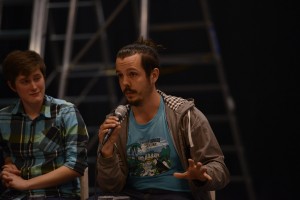During the Green Talk at Välj Rättvisa Nu, issues concerning urban gardening, Swedish agriculture production and access to food were discussed.
It was pointed out during the discussion that the question of food security and sovereignty is far more complicated than the simple association people usually have in mind. Karin Jansson, specialist in urban gardening and ecological farming, started by recalling the yesteryears, when in her childhood, agriculture was different from what it is now:
“Today agriculture is sort of business, or industry, where everything is produced for profits. The Swedish farmers, in the context of integrated world economy, are competing on the global market. However, the Swedish agricultural products are not competitive at all, as there are a lot of countries in the world that can produce grain with a very low cost.”
Although it was questioned whether Swedish agriculture sector is sustainable, Karin Jansson concluded with optimism:
“Actually, it was estimated that all Swedish farming lands are able to support 30 million people, so there is no worries about access to food”.
Problem of malnutrition
Molly MacGregor, PhD student from Lund University Center for Sustainability Studies, shared with the audience her experience in Kyrgyzstan, where she stayed 7 months to do a case study. She said that the this country, called as “Switzerland of Central Asia” by the locals, has huge problems in access to food:
“Although almost every family owns a piece of land where they can cultivate according to their own needs, it is obviously not enough – the problem of malnutrition among children in Kyrgyzstan is very severe”.
She goes on saying:
“Because of the changes of seasons, the families are in great need for land as they need to store enough food for the winter, it may be difficult for those who rent the land out to have problems get it back. So even though many households do not lack land, but nevertheless it is not enough for producing sufficient food”.

Photo: Daniel Kodipelli
Peasant movement
The discussion went further on talking about the landless problem in Latin America, where Max da Rocha, who was involved in the work of Latin America Group, La via Campesina, has pointed out that the problem of food security and especially food sovereignty is deeply connected to politics and the power allocations:
“The problem of landlessness is extremely severe in Latin America, as a result, the group of landless farmers, marginalized groups and generally poor people in the region initiated the peasant movement La via Campesina”.
The movement has certain achievements in recent years, and Max da Rocha goes on saying that “nowadays, agriculture production in large scales has led to drastic changes in food production industry”.
A global struggle
All in all, the Green Talk gave the audience a better understanding of the problems regarding food security and food sovereignty, that actually the problems of access to food is very complicated and the process of food production involves a large number of issues linked directly with it. Just as Max da Rocha stressed, there is need for a “global struggle, need for tighter cooperation”, to secure access to food and people’s right to decide over their own food production.





